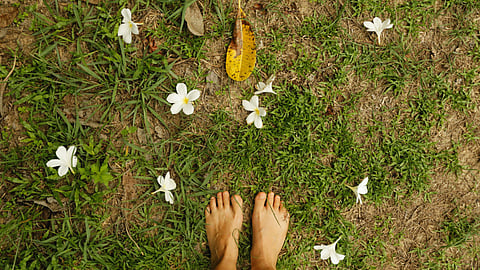
- LIFESTYLE
- FASHION
- FOOD
- ENTERTAINMENT
- EVENTS
- CULTURE
- VIDEOS
- WEB STORIES
- GALLERIES
- GADGETS
- CAR & BIKE
- SOCIETY
- TRAVEL
- NORTH EAST
- INDULGE CONNECT

“Touch some grass” has become a common phrase on the internet. It is a snappy way to tell someone to unplug and reconnect with the real world. But what if we told you that touching grass might actually be good for your health?
Think about it: when was the last time you kicked off your shoes and let your feet sink into cool morning grass? Felt the dew, the soil, the uneven surface beneath you?
In an age dominated by screens, concrete, and constant connectivity, many of us have lost touch with the natural world. Walking barefoot outdoors, once second nature to our ancestors, is now a rare experience. But this simple act could be the key to restoring balance in both body and mind. It's called grounding.
Grounding, also known as earthing, involves direct physical contact with the Earth’s surface. You can try walking barefoot on grass, soil, or sand.
The idea is rooted in the belief that the Earth carries a mild negative electric charge, and connecting with it allows our bodies to absorb electrons that may help neutralise free radicals and reduce inflammation.
Historically, people walked barefoot or slept on the ground, which allowed their bodies to absorb some of this natural electron charge. Today, most of us wear shoes with synthetic, nonconductive soles and have less direct contact with the ground.
Some studies suggest that this loss of “grounding” might contribute to the increasing rates of chronic inflammation and related diseases, such as diabetes.
Grounding offers a small but meaningful way to reconnect. And the benefits go beyond just a feel-good moment.
It may reduce markers of inflammation in the body. This is thought to be due to the transfer of electrons from the Earth, which act as antioxidants that neutralize harmful free radicals.
Grounding has been linked to more stable cortisol levels, the hormone that regulates stress and sleep cycles. People who practice grounding often report better, more restful sleep.
Chronic pain and muscle soreness may also be alleviated by grounding. Some studies indicate that it can speed up recovery time and reduce discomfort after physical activity.
There’s evidence that grounding can improve blood flow and oxygenation, which may enhance heart health and overall vitality.
By lowering inflammation and cortisol, grounding may support better immune function, by helping your body defend itself more effectively.
In a world of complicated night routines, red light therapy, and numerous skincare strategies, grounding offers a refreshingly accessible alternative.
So, the next time someone tells you to “touch some grass,” do it. Step outside, slip off your shoes, and let the Earth restore you.